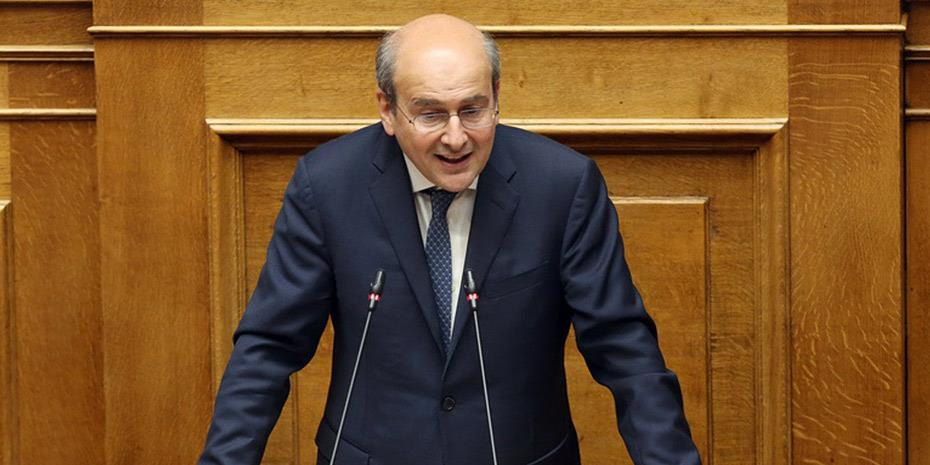
The Minister of Economy and Finance, Kostis Hatzidakis, described the bill entitled "Restructuring of the Hellenic Holding and Property Company and its subsidiaries" as a reform that changes the image of the Hellenic Growth Fund, making it contribute to the development of the economy and serve the ordinary Greek citizen more effectively through its subsidiaries.
Speaking at the competent committee of the Parliament where the debate on the bill began, the minister presented the four main pillars of the interventions, calling on the opposition to answer whether or not they are modernization interventions and whether or not they will vote for them. "I would like," he said, referring to the regulation on the absorption of the Hellenic Investment Fund by the State Treasury, "to see the parties of the Left sign up to the operation of the Hellenic Investment Fund!"
AXES OF INTERVENTION
First, the Growth Fund is strengthened organizationally through the absorption into it of the Hellenic Privatization Fund and the HFSF. "The Hellenic Republic Development Asset Fund has completed a number of privatizations, and the HFSF has finished to a very significant extent its job, which was to disinvest from the banks. Do you want there to be separate boards, boards of directors, and fees?" the minister asked. In the same context, the governance model is being changed with the establishment of a Corporate Governance Council, in which the lenders participate with limited powers instead of the Supervisory Board that currently exists.
Secondly, modernization of the operation of the subsidiaries of the Ypertifonds, with the aim of making them "small PPCs" in terms of the way they operate, the way they recruit senior managers and employees, and procurement.
"We want to make a new start in these companies from the point of view of the many defenseless Greeks. The average customer is the consumer of the services they offer. Is that bad? Certainly, we should not do injustice to the employees. But not to look at the average citizen? Do we want dissatisfied people who are suffering because there are indeed very serious problems today on buses, trolleybuses, etc.? Don't we want them to be upgraded? What kind of pro-people policy do we stand for if we don't look at these people? We have to be their voice; that's what we did with PPC, and it is the impertinence of Syriza that bankrupted it to wag its finger today," said Mr. Hatzidakis.
He added, "What are we going to say to the people who are suffering from the buses and trolleys? The rigidities of the AEP are above all because we have the 'Holy Public Service' from which we cannot escape. I don't. It is deeply unpopular to cling to the "Holy Public.". I don't believe it, and I never will.
That's why we enable the private sector to attract staff from the private sector, make their recruitment processes more flexible, and make their day-to-day operations more efficient by improving their procurement system. Between the criticism of golden boys and the criticism we would face for failure if we didn't do what we do, I prefer the criticism of golden boys. I want, from whatever position I leave, to have concrete, measurable work. Not for the left, but for the many defenseless Greeks."
The interventions provided for in the bill also include the managerial right to company CEOs and the abolition of the participation of trade unionists in disciplinary boards. "Trade unionists will participate in the boards of directors but disciplinary boards are quasi-courts. Trade unionists are not judges. They have different roles; I say this clearly and without any guilt complex towards the doctrines of the Left," the minister stressed.
Thirdly, the creation of the new National Investment Fund with initial funding from the sums paid by the state for the repurchase of EYDAP and EYATH. Hatzidakis said that contacts are being made with the European Investment Bank and investment funds from abroad, particularly from the Arab world, in order to contribute to the new fund. The aim is to fill the investment gap in specific market sectors and not substitute large foreign investors or venture capital funds.
As for the criticism of the hiring of the internationally renowned Blackrock for the establishment of the new fund, Mr Hatzidakis questioned: "Would you rather we took an executive from the Southwest or your own? Let Greece change its era. Let's not see others take steps forward; we stay in the 80s and 90s."
Fourthly, the Hellenic Piraeus Port Authority is granted the right, which it did not have, to use 50% of the revenues it receives from port and port infrastructure development contracts to finance the implementation of the Master Plans of other ports in its portfolio. Under the previous framework, all of the revenues of the Hellenic Fund were directed exclusively to debt reduction.
"I am proud," the Minister concluded, "not only of the modernization of the role of the YPF but also because, after the agreement with the ESM, it will be able to contribute much more to the growth of the economy, especially with the investment fund. But also because its subsidiaries, as was the case with PPC, will serve citizens by moving into a new era."






